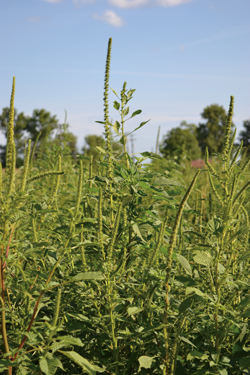As another growing season begins, production agriculture is confronted with important choices. Among them is whether the farming community and policy makers will heed the clear warnings from herbicide-resistant weeds that industrial monoculture farming methods are not sustainable.

Palmer amaranth (aka pigweed) infests a soybean field. Photo: United Soybean Board/Flickr
The epidemic of weeds that have developed resistance to glyphosate herbicide, used on glyphosate-resistant GMO crops, is an important symptom of the problems with our current farming system. Mismanagement of this weed control system has predictably led to glyphosate resistant weeds, and along with them, greatly increased herbicide use and harm to farms and the environment.
Some have noted that resistance to pesticides is nothing new. True. But the almost exclusive use of these GMO crops, and the glyphosate used with them, has led to exceptional evolutionary pressure for resistance to develop. For example, for most of the last decade, over 90 percent of soybeans grown in the US have been GMO glyphosate-resistant. This exacerbates weed resistance tendencies inherent in monocultures and the problems that come with them. The lack of regulations that could require methods to prevent or reduce the development of resistant weeds is also an important key to this problem. As a consequence, USDA is poised to approve the next generation of GMO herbicide resistant crops without adequate safeguards.



0 Comentarios:
Publicar un comentario
Suscribirse a Comentarios de la entrada [Atom]
<< Página Principal